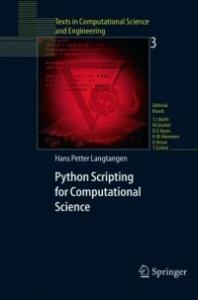
|
FreeComputerBooks.com
Links to Free Computer, Mathematics, Technical Books all over the World
|
|
- Title: Python Scripting for Computational Science
- Author(s) Hans Petter Langtangen
- Publisher: Springer; eBook (Online Editions)
- Hardcover/Paperback: 784 pages
- ebook: PDF
- Language: English
- ISBN-10: 3642093159
- ISBN-13: 978-3642093159
- Share This:

|
With a primary focus on examples and applications of relevance to computational scientists, this brilliantly useful book shows computational scientists how to develop tailored, flexible, and human-efficient working environments built from small scripts written in the easy-to-learn, high-level Python language. All the tools and examples in this book are open source codes. This third edition features lots of new material. It is also released after a comprehensive reorganization of the text. The author has inserted improved examples and tools and updated information, as well as correcting any errors that crept in to the first imprint.
About the Authors- N/A

- Python Scripting for Computational Science (Hans Petter Langtangen)
- The Mirror Site (1) - 3rd Edition - PDF
- The Mirror Site (2) - 3rd Edition - PDF
- A Primer on Scientific Programming with Python (Hans Petter Langtangen)
-
 Programming for Computations - Python 3 Edition
Programming for Computations - Python 3 Edition
This book outlines the shortest possible path from no previous experience with programming to a set of skills that allows students to write simple programs for solving common mathematical problems with numerical methods in the context.
-
 Introduction to Scientific Programming with Python
Introduction to Scientific Programming with Python
This book offers an initial introduction to programming for scientific and computational applications using the Python programming language. The presentation style is compact and example-based, assuming little or no prior experience in programming.
-
 First Semester in Numerical Analysis with Python (Yaning Liu)
First Semester in Numerical Analysis with Python (Yaning Liu)
This book introduces students to Numerical Methods using Python for the implementation of the algorithms. Discusses several common applications of Numerical Analysis and implementation using real world examples and hands on programming exercises.
-
 Solving PDEs in Python: The FEniCS Tutorial I (H. Langtangen)
Solving PDEs in Python: The FEniCS Tutorial I (H. Langtangen)
This book offers a concise and gentle introduction to finite element programming in Python based on the popular FEniCS software library. Using a series of examples, it guides readers through the essential steps to quickly solving a PDE in FEniCS.
-
 Introduction to Python for Computational Science and Engineering
Introduction to Python for Computational Science and Engineering
This book summarises a number of core ideas relevant to Computational Engineering and Scientific Computing using Python. The emphasis is on introducing some basic Python (programming) concepts that are relevant for numerical algorithms.
-
 Computational Physics with Python (Eric Ayars)
Computational Physics with Python (Eric Ayars)
This book provides an unusually broad survey of the topics of modern computational physics. Its philosophy is rooted in learning by doing, with new scientific materials as well as with the Python programming language.
-
 Computational Physics with Python (Mark Newman)
Computational Physics with Python (Mark Newman)
A complete introduction to the field of computational physics, with examples and exercises in the Python programming language. It explains the fundamentals of computational physics and describes the techniques that every physicist should know,.
-
 Python Scientific Lecture Notes (Scipy Lectures)
Python Scientific Lecture Notes (Scipy Lectures)
A teaching material on the scientific Python ecosystem, a quick introduction to central tools and techniques. It is for programmers from beginner to expert. Work on real-world problems with SciPy, NumPy, Pandas, scikit-image, and other Python libraries.
-
 From Python to NumPy (Nicolas P. Rougier)
From Python to NumPy (Nicolas P. Rougier)
NumPy is one of the most important scientific computing libraries available for Python. This book teaches you how to achieve expert level competency to perform complex operations, with in-depth coverage of advanced concepts.
-
 Guide to NumPy (Travis E. Oliphant)
Guide to NumPy (Travis E. Oliphant)
This book is for programmers, scientists, or engineers, who have basic Python knowledge and would like to be able to do numerical computations with Python. It will give you a solid foundation in NumPy arrays and universal functions.
-
 NumPy Tutorials (Usman Malik, Anne Bonner, et al)
NumPy Tutorials (Usman Malik, Anne Bonner, et al)
They provide everything you need to know to get started with NumPy. They also explain the basics of NumPy such as its architecture and environment, discusses the various array functions, types of indexing, etc. With examples for better understanding.
-
 Scipy Lecture Notes (Emmanuelle Gouillart, et al)
Scipy Lecture Notes (Emmanuelle Gouillart, et al)
This book is the teaching material on the scientific Python ecosystem, a quick introduction to central tools and techniques. It is for programmers from beginner to expert. Work on real-world problems with SciPy, NumPy, Pandas, scikit-image, and other Python libraries.
-
 SciPy Programming Succinctly (James McCaffrey)
SciPy Programming Succinctly (James McCaffrey)
This book offers readers a quick, thorough grounding in knowledge of the Python open source extension SciPy. The SciPy library, accompanied by its interdependent NumPy, offers Python programmers advanced functions that work with arrays and matrices.





